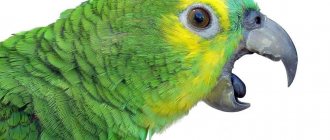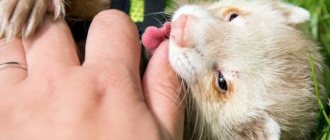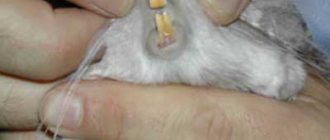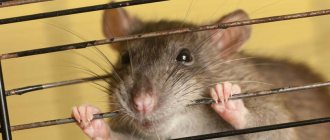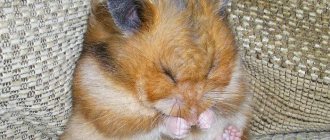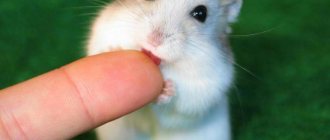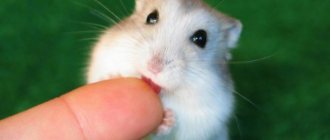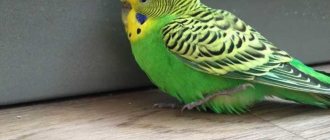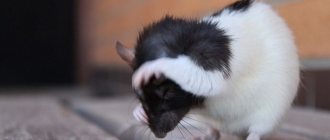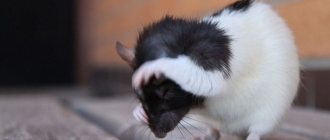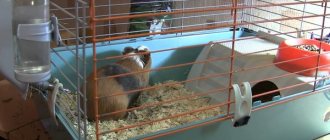Kakadu is translated from Malay as “biters”. This name for this large bird was not chosen by chance - its 10-centimeter beak can easily bite a human finger. In other breeds, the beak is not so large, but in any case it can pose a threat to the owner of the feathered friend. Let's find out why parrots love to bite and how to wean them from this habit.
Is aggressive behavior considered deviant?
In nature, parrots use their beak not only when communicating with other individuals, but also for cracking nuts and eating food.
They use it when climbing trees, but rarely use it for defense or attack. Typically, aggression in the natural environment is presented in the form of screaming and flapping its wings.
For parrots living in captivity, the beak is an effective weapon for protection from strangers , other pets or unpleasant relatives. If a pet has bitten a person severely, you should not scream, swear, or click the bird’s beak, as this will cause even greater aggression, and will also make it difficult to tame.
The bites of an aggressive wavy are not a slight tingling, but a full-fledged rupture of the skin, and therefore can lead to serious injuries.
If a bird behaves calmly in front of strangers and does not try to bite a person, then this is considered a bad sign. Usually this indicates the presence of some serious diseases, so the bird simply does not have the strength to show aggression and defense. Weakened individuals become apathetic and calm, so their behavior reveals health problems.
Is your parrot tame?
Not really
Startle response
Stress and fear force your pet to defend itself. In the wild, a bird has two options to avoid danger: defend itself with its beak or run away. Under natural conditions, birds often prefer to hide from their pursuer. A pet is deprived of such a chance and the only way out for it is to bite.
Fear of a parrot is one of the reasons for its bites
As practice shows, the owner often does not even know the reason for the shock in his feathered friend. The source that causes fear in a pet can be a running vacuum cleaner or air conditioner. When a pet is frightened, it hisses threateningly and extends its head towards an object or person.
If the parrot is recently purchased, there is a high chance that the new owner will be bitten. Once in an unexplored apartment, he does not make contact with the person. Therefore, it is advisable to wait a little while getting acquainted. Before picking up a bird, it needs to be given time to adapt to its new environment.
Why does the wavy bite and become aggressive?
There are several reasons why a parrot bites. Aggressive behavior can manifest itself not only before taming, but also in a bird that calmly walked towards its owner.
Puberty
Usually people do not experience any particular difficulties with taming if they acquire a young individual. To establish contact, it is enough to feed the bird by hand, pamper it with treats, speak in a pleasant and soft voice, and also pay a lot of attention to it, playing with different toys. But at a certain point in time, the pet’s behavior changes dramatically. If a bird suddenly begins to bite and behave aggressively, this may be due to puberty.
Even the kindest and most cheerful parrots at this time become angry, gloomy and unfriendly. They happily bite the hands of the owner, with whom they previously kissed and played. Typically, such aggression goes away after the end of the maturation period, so the bird becomes affectionate and playful.
If at this time the bird notices that it can manipulate a person with the help of bites, then this habit is reinforced, so it will be quite difficult to wean it off.
A surge in hormones can occur for various reasons, including increased daylight hours, increased humidity, or other external factors. Sometimes the process even begins with daily bathing in the summer. Typically, aggressive behavior is characteristic of males, not females.
Games with rustling objects
If a person lets his pet play with rustling paper bags, boxes or sawdust, this stimulates the reproductive instinct. Birds often associate such soft objects with a nest, and the wavy bird chooses a human as its partner, so it will bite him. With these actions, the wavy insists that the hand remain in the cage.
If paper or boxes are left in a cage where a couple of wavy birds live, then fights can even occur between the birds. If they begin to prepare the nest and prepare for mating, then the aggression will be directed at the person who will interfere with the birds. Males under such conditions treat people as rivals, so they bite hands. Usually such bites are really painful and also leave deep wounds.
Audible and visual stimuli
Sometimes birds become excited by various external stimuli, which leads to aggression. They begin to quickly run around the cage, bite, scream and fly from perch to perch.
Typically this reaction occurs to the following stimuli:
- meeting a new bird or pet;
- placing a pair of parrots in different cages, so the birds see and hear each other, but do not have the opportunity to be close to each other;
- rustling of paper, candy wrappers or cellophane;
- extraneous sounds, for example, pouring water, and often such sound becomes the cause of aggressive behavior;
- the squeak of hungry chicks, to which the female or male for various reasons do not have access;
- sounds of birds from the street.
The above irritants can cause aggression, so it is important to monitor your pet’s behavior to determine the main stimulus.
Territory defense
If the bird has constant and free access to the apartment, since the cage is open all the time, then it may have a desire to protect its territory. This usually manifests itself in the fact that the wavy constantly sits on the lid of the cage, and also screams loudly when other birds, pets or humans approach.
Such parrots have a negative attitude even towards cleaning the cage, so they bite their hands a lot. This indicates that the bird is afraid of losing its territory. To change the bird's behavior, you need to place the cage on the floor or on a low shelf so that it is below the person's eyes. It is advisable to close the bird in a cage for several days so that it wants to be free and refuses to defend the territory.
Aggression
Many owners allow the pet to climb onto their shoulder, where the bird spends a lot of time. Ornithologists are confident that such a solution leads to bad results. Wavy becomes confident in himself, and also considers the person not as a master, but as a rival. Therefore, he can bite the hand, ear or other part of the body at any time.
In practice, there have been cases when tamed wavy animals suddenly showed aggression , leaving scars on the face or even damaging the integrity of the eyeball. It is quite difficult to remove a bird from your shoulder without screaming and biting. Therefore, it is advisable to hold the wavy on your hand during games and communication, without bringing it to eye level.
Active entertainment
The reaction of parrots to active pastime can be compared with the consequences of children's active games. At first, the wavy bird enjoys attention, play and communication, but after a while the bird becomes uncontrollable. She begins to pinch and bite, and does not realize that she is hurting.
If such games are played with an adult parrot, then they act as a competition, thanks to which the pet determines the leader, and it is he who strives to achieve the most important positions. If the owner condones this behavior and also allows the parrot to bite household members, then aggression will only develop.
The silence of a person signals that the wavy is really the head of the family, and therefore will bite all family members without good reason. Therefore, at the first signs of aggression during play, it is advisable to stop all entertainment, put the bird in a cage, and also say the word “No” in a stern voice. Such actions will allow you to control the dispersed parrot.
Fear or stress
Bites are often a way of defense during stressful situations. If a bird is afraid of a person who does not use effective taming methods, it will bite hands and other parts of the body.
Under such conditions, it is necessary to take the advice of ornithologists to quickly get closer to the parrot. This will reduce stress, establish friendly and trusting relationships, and the wavy will begin to feel calm and free in the apartment or house.
Jealousy
Although wavy birds are curious and sociable birds, they can be jealous of their beloved owner of other birds, pets or even people. Sometimes people note that their pet is jealous of inanimate things. Often wavy animals have a negative attitude towards the other halves of their beloved owner. They are afraid that a person's love and attention will spread to another, so they begin to bite to attract attention.
Jealousy is especially evident when a person is talking on the phone without paying attention to his pet, so at this time the bird begins to bite heavily, scream and fly around the owner.
Violation of the regime
It can be presented in several varieties:
- Feeding at night or at different times. Parrots feel negative if they receive food too late or without any schedule. For them, food is an important part of life, so they suffer in its absence. If the owner cannot give food to the pet in a timely manner, this leads to aggression and bites.
- Nap. Birds need to sleep for quite a long time, at least 8 hours. Some individuals even need 10 hours of sleep. If the wavy does not get enough sleep, then it becomes nervous, irritable and aggressive. Often this condition becomes the cause of early puberty. To prevent such negative consequences, it is recommended to cover the cage with thick fabric at night and not turn on the light at night.
- Waking up early. If the bird wakes up too early, it may bite because it feels tired. Therefore, it is recommended to wait a little, after which you can release the bird from the cage and begin communication.
- Long absence of the owner. If a loved one goes on vacation or a business trip, the bird becomes irritated, nervous and worried. After returning, the wavy begins to rejoice and get excited, which often leads to aggressive behavior.
To avoid such negative consequences, it is recommended to establish the correct sleep and rest schedule in advance.
Problems with taming
If you buy not a young chick, but an already adult wavy bird, then difficulties with taming often arise. They cause the bird to behave aggressively.
These include:
- the bird is not aware of important norms and does not respect the boundaries set by the owner, and it is almost impossible to wean a five-year-old bird from biting;
- fast pace of taming, so it is advisable to choose a slower and calmer pace that does not cause negativity in the pet;
- learning words, which often leads to agitation, so you need to stick to the learning plan;
- lack of freedom, so if a bird spends too much time in a cage, then it will be unhappy with the person;
- loneliness, so if the wavy cannot communicate with relatives or people throughout the day, then it becomes irritable and wild, which leads to severe bites.
Therefore, it is necessary to pay as much attention as possible to training your parrot.
The parrot loves to bite
Some wavy fish are experienced manipulators, so they achieve their goals with the help of bites. They force the owner to do the things they need. If they don’t like a person’s behavior, they bite, scream loudly and flap their wings.
You cannot indulge such behavior, since it is almost impossible to wean a bird from biting if it is spoiled and arrogant.
Parrot training
Taming a parrot is one way to prevent attacks from it. A bird that is not afraid of human hands is less likely to show aggression, since it trusts its owner more and bites less.
A small parrot needs to be taught from early childhood to sit on your finger. With proper patience, anyone can do this. You need to put your finger on the parrot's chest and push the pet slightly. He will lose his balance and grab onto it.
The main thing is not to stop after the first lesson if it turns out to be unsuccessful. Sooner or later the bird will perform the necessary action, and it will really like sitting on your finger. In the future, this will prevent the occurrence of such problems as biting or painfully pinching the owner's hands, face and ears with its beak.
When the parrot gets used to sitting on your finger and taking food from your hands, you can move on. The task at this stage is to show the bird that it can be removed from the cage using your finger. First you need to stay close to the cage - for the parrot this is the safest place in the house. Then you should take the bird some distance away from it. The purpose of the classes is to show the parrot that he can trust his owner, and ultimately to wean him from biting (or prevent the development of such a habit).
You need to train a parrot only in those moments when he is in the mood to do so. As soon as the bird begins to show indifference to what is happening, the lesson must be stopped - there will be no benefit from it anyway.
How to stop a wavy from biting
To do this, follow simple steps:
You need to train your pet from the first days after purchase;- after a bite, you should not scream, hit or swear at the wavy, as this will lead to fear and stress, and the bird will become even more aggressive;
- you cannot withdraw your hand;
- it is advisable to be offended and immediately stop playing;
- if the bird begins to behave aggressively, then you need to divert its attention to play or treats;
- the wavy should be tamed to the word “impossible”;
- It is recommended to praise the bird for any minor achievements.
Only through patience can you achieve your goal.
Causes of bites
Puberty of birds
Most people do not experience problems with birds until the birds reach sexual maturity. And only then the owners wonder why the parrot became aggressive and bites. I have seen cute chicks turn into real monsters when they reach this stage of development. In this case, aggression is usually limited to the breeding season, after which the bird again becomes affectionate as before. But if the bird realizes that by biting you it can get its way, the hormonal behavior-driven bites may not stop and become a serious problem in the future.
Age: adult bird or chick
Cockatiels are cheerful and cheerful companions. They are very smart and easily learn to speak, perform tricks and simple requests.
As I already mentioned, it would be best to bring home a young chick, who will quickly accept the new environment and make friends with the owner. But the opportunity to adopt a chick is not always given.
Already from the age of one year, parrots find it difficult to perceive innovations and changes in life. Interaction with the bird must be carefully established.
The ways to make friends with a young or adult nymph are not particularly different.
But remember! Those who lived in a pack of their own kind find it difficult to tame. In this case, they prefer communication with their fellow tribesmen rather than with humans.
Description of birds
This is one of the most common living creatures kept in the house. Exotic, colorful plumage, active, inquisitive, cheerful birds.
Description of parrots and the reasons why they constantly scream
There are many different types and sizes. There are many advantages of their content - they do not take up much space, they please the eye with their outfit, they repeat individual words and even phrases of human speech, simple melodies, and fill leisure time. At the same time, without particularly bothering the owner with the troubles of its maintenance. And feeding, with the current assortment of grain mixtures in pet stores, also does not become a problem.
But among the disadvantages of having parrots in the house, the most important is the noise these creatures produce.
